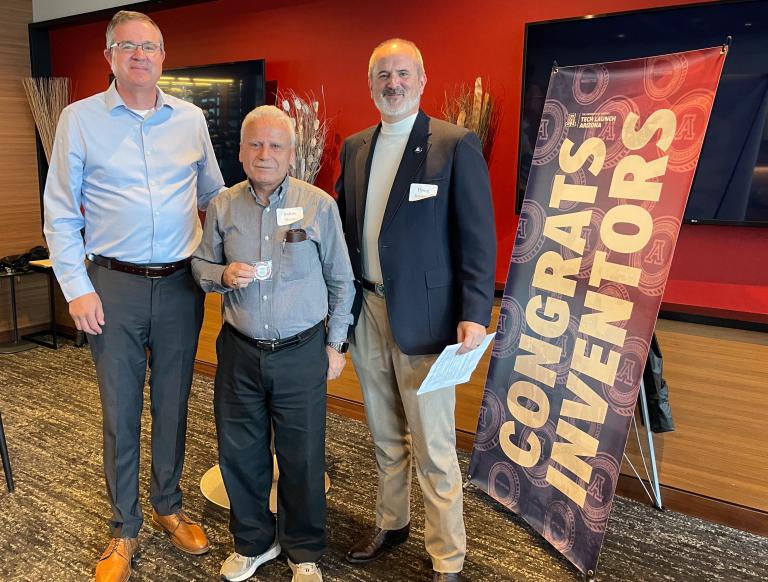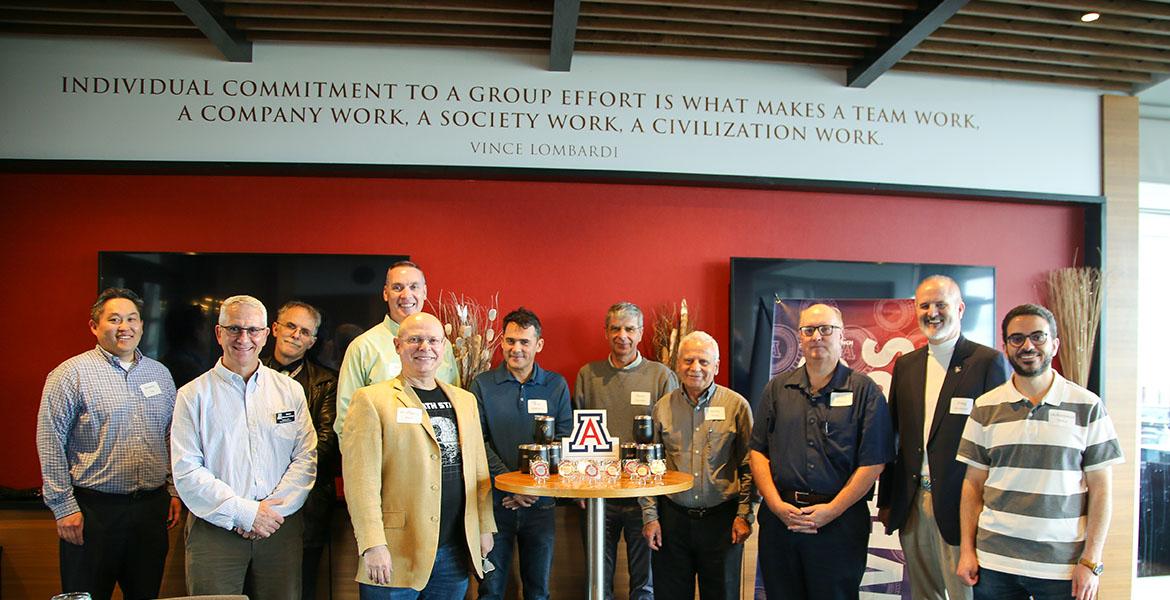2024 Patent Luncheon Marks a Year of Engineering Breakthroughs
Every year, leaders from Tech Launch Arizona and the College of Engineering gather to award medallions to the researchers and professors recently granted patents for inventions that better the human condition.
Attendees at this year’s Feb. 28 event celebrated Engineering’s inventors for improving health care and accelerating computing, among other achievements.
“Thank you for being engaged with us,” Doug Hockstad, assistant vice president of Tech Launch Arizona, the University of Arizona’s commercialization arm, told the engineers. “Getting a patent issued is national acknowledgement of the importance of an invention,” he said, adding that college faculty were involved in over 20% of the university’s patents for the past year.
Helping People and the Economy
David W. Hahn, the Craig M. Berge Dean, said he takes pride in the college’s status as a top patent producer for the university.
“It speaks to the college, that we are drivers of an economic engine,” he said. “These technologies go into the world and create spinout companies and enrich the economy.”
One such new company is SeVA, or Senior’s Virtual Assistant, formed by electrical and computer engineering professor Salim Hariri, together with two professors from the College of Medicine – Phoenix, to commercialize artificial intelligence technology they patented this past year.

Among Senior GPT’s benefits is the ability to detect conditions such as dementia and depression more accurately and at earlier stages than the current standard method, said Hariri. A nurse asks the patient questions and scores their answers.
“The problem is, that’s subjective, so 50% of elderly people with dementia leave hospitals with the condition undetected,” he said.
Senior GPT uses wearable sensors that record biological data, as well as voice and word analysis, to make more accurate diagnoses, leading to more effective treatment. The system can also prevent falls – when a patient starts to rise, it asks what is needed, then sends a caregiver to help – and provide other important alerts.
Hariri is developing the product and company with associate clinical professor Nimit Agarwal and assistant research professor Sumit Agarwal. Tech Launch Arizona granted them the funds to build a prototype, and the inventors are in discussions with several hospitals in Los Angeles to test the Senior GPT system.
“There’s a huge demand for nurses, and this can help reduce their load and also help families take care of loved ones,” said Hariri.
National Resources and Reputation
The federal agencies sponsoring much of the college’s work are embracing the concept that innovation begins with academic research, said Mark Van Dyke, associate dean of research.
“It’s become increasingly important for universities to conduct applied research. That level of activity is absolutely on the rise,” he said.
The College of Engineering’s research expenditures increased 19% to $63 million in 2023. One high-profile award went to a group led by materials science and engineering professor Pierre Deymier, who earned a patent this year for an information encoding method. The National Science Foundation granted $30 million over five years to bring together researchers working in topological acoustics with the New Frontiers of Sound Science and Technology Center.
Two more of this year’s patents went to engineering professors Wolfgang Fink and Douglas Loy, who were elected into the 2023 National Academy of Inventors Class of Fellows. Loy, an MSE professor, is a prolific inventor known for innovations in areas including polymer synthesis, fuel cell membranes and long-lasting sunscreens. He added to his list of sunscreen patents during the past year. Fink, the Edward and Maria Keonjian Endowed Chair and an ECE professor with several joint appointments, is renowned for advances in ophthalmology and vision care, human/brain-machine interfaces, and autonomous systems. Like Loy, Finks holds dozens of patents; he was granted one in 2023 for an automated network-on-chip design.
Dr. Marvin Slepian, who was awarded three patents in 2023, was appointed to the U.S. Patent and Trademark Office’s Patent Public Advisory Committee in December. Slepian, a Regents Professor of Medicine and Biomedical Engineering, will serve three years on the committee, which is composed of private-sector intellectual property executives who advise the patent office on matters related to the policies, goals, performance, budget and user fees of the patent operation.
"I really appreciate the faith that the USPTO showed in me by placing me on this committee. I recognize that this is a very important responsibility, to provide guidance, insight and help to drive the invention and innovation mission of USPTO for the country,” said Slepian, whose research has led to the development of novel diagnostics and therapeutics for cardiovascular diseases, including stent technologies that prevent blood clots and the only FDA-approved total artificial heart.
Engineering Patents for the Year
The following is a full list of Engineering faculty members who received medallions.
Aerospace and Mechanical Engineering
Peiwen Li – Heat Recovery Apparatus, System and Method
Biomedical Engineering
Marvin Slepian – Systems and Methods for Analyzing Platelet Function; Methods for Determining Cell Stiffness; and Breathing Signatures in Respiratory Disease
Chemical and Environmental Engineering
Dominic Gervasio (retired) – A System for Leaching Metal and Storing Energy
Electrical and Computer Engineering
Salim Hariri – SeVA: Senior’s Virtual Assistant
Ivan Djordjevic – Probabilistically Coded Fronthaul Networks
Wolfgang Fink – Automated Network-On-Chip Design
Materials Science and Engineering
Pierre Deymier – Sound System With Fermionic Quantum-Like Behavior
Douglas Loy – Bridged Polysilsesquioxane Based Sunscreens
Systems and Industrial Engineering
Mohammed Shafae – Sensor Signal Prediction at Unreported Frequencies
Young-Jun Son (former faculty member) – Simulation-Based Resource and Layout Optimization


